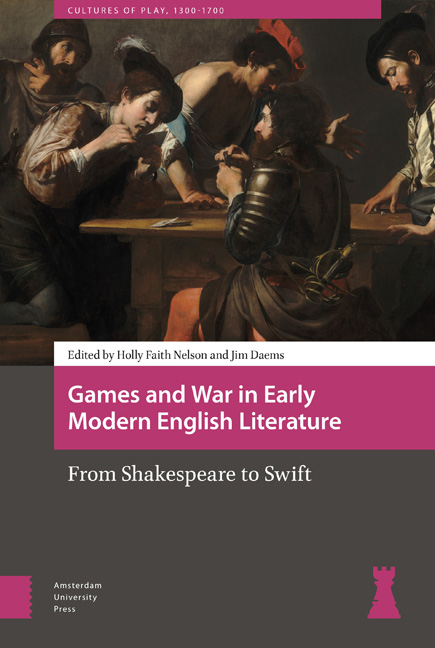Book contents
- Frontmatter
- Dedication
- Contents
- Acknowledgements
- The Interplay of Games and War in Early Modern English Literature: An Introduction
- 1 ‘Can this cock-pit hold the vasty fields of France?’ Cock-Fighting and the Representation of War in Shakespeare’s Henry V
- 2 Game Over: Play and War in Shakespeare’s Troilus and Cressida
- 3 Thomas Morton’s Maypole: Revels, War Games, and Transatlantic Conflict
- 4 Milton’s Epic Games: War and Recreation in Paradise Lost
- 5 Ciphers and Gaming for Pleasure and War
- 6 Virtual Reality, Role Play, and World-Building in Margaret Cavendish’s Literary War Games
- 7 Dice, Jesting, and the ‘Pleasing Delusion’ of Warlike Love in Aphra Behn’s The Luckey Chance
- 8 War and Games in Swift’s Battle of the Books and Gulliver’s Travels
- 9 Time-Servers, Turncoats, and the Hostile Reprint: Considering the Conflict of a Paper War
- Index
The Interplay of Games and War in Early Modern English Literature: An Introduction
Published online by Cambridge University Press: 21 November 2020
- Frontmatter
- Dedication
- Contents
- Acknowledgements
- The Interplay of Games and War in Early Modern English Literature: An Introduction
- 1 ‘Can this cock-pit hold the vasty fields of France?’ Cock-Fighting and the Representation of War in Shakespeare’s Henry V
- 2 Game Over: Play and War in Shakespeare’s Troilus and Cressida
- 3 Thomas Morton’s Maypole: Revels, War Games, and Transatlantic Conflict
- 4 Milton’s Epic Games: War and Recreation in Paradise Lost
- 5 Ciphers and Gaming for Pleasure and War
- 6 Virtual Reality, Role Play, and World-Building in Margaret Cavendish’s Literary War Games
- 7 Dice, Jesting, and the ‘Pleasing Delusion’ of Warlike Love in Aphra Behn’s The Luckey Chance
- 8 War and Games in Swift’s Battle of the Books and Gulliver’s Travels
- 9 Time-Servers, Turncoats, and the Hostile Reprint: Considering the Conflict of a Paper War
- Index
Summary
The association of warfare and games has a long history. The phrase ‘war game’ was coined in 1728 by A.B. Granville to refer to a military simulation, with Granville describing ‘the “war-game” table, on which the present Emperor, when Grand-duke, used to play’. However, war games or the games of war, including military reenactments, date back to ancient times, as Helen Lovatt explains in Statius and Epic Games: Sport, Politics and Poetics in the ‘Thebaid’. While Lovatt insightfully studies ‘the relationship between games and war’ in one classical text, there are very few studies of the intersection of these two concepts and the discourses that surround them in the literature of the seventeenth and eighteenth centuries. Though there are a wide spectrum of books and articles on war and literature in general in early modern England as well as a number of studies on the mediation of medieval and early modern warfare in contemporary video games, this collection of essays carves out a new conceptual path by examining the ways in which the language of games and warfare inform and illuminate each other in the early modern cultural imagination. The essays herein explore how warfare and games are mapped onto each other in aesthetically and ideologically significant ways in early modern poetry, drama, prose fiction, and prose non-fiction. In so doing, their authors address the terms ‘war games’ or ‘games of war’ in the broadest possible sense, which frees them to uncover the more complex and abstract, rather than purely concrete, interplay of war and games in the imaginations of early modern writers. In theorizing the relations between war and games in works from Shakespeare's Henry V through Swift's Gulliver's Travels, the contributors to this volume also draw on recent historical and theoretical work on war games.
In the past decade, two monographs and a collection of essays have been published that are useful in establishing the nature and significance of the interplay of games and warfare in early modern literature: Philipp von Hilgers's War Games: A History of War on Paper (2008; 2012 English translation), Martin van Creveld's Wargames: From Gladiators to Gigabytes (2013), and Pat Harrigan and Matthew G. Kirschenbaum's 59-chapter Zones of Control: Perspectives on Wargaming (2016). All three volumes attempt to rework the definition of war games and to consider how the practice of war-gaming evolved over time and across various media.
- Type
- Chapter
- Information
- Games and War in Early Modern English LiteratureFrom Shakespeare to Swift, pp. 11 - 22Publisher: Amsterdam University PressPrint publication year: 2019



